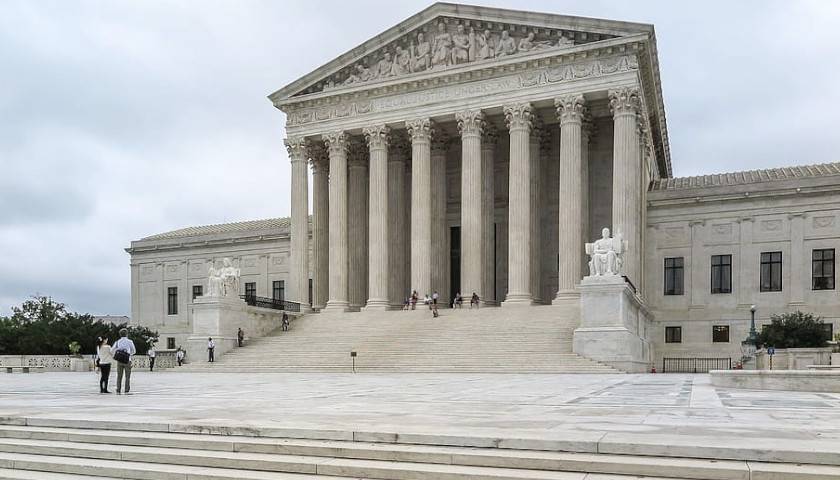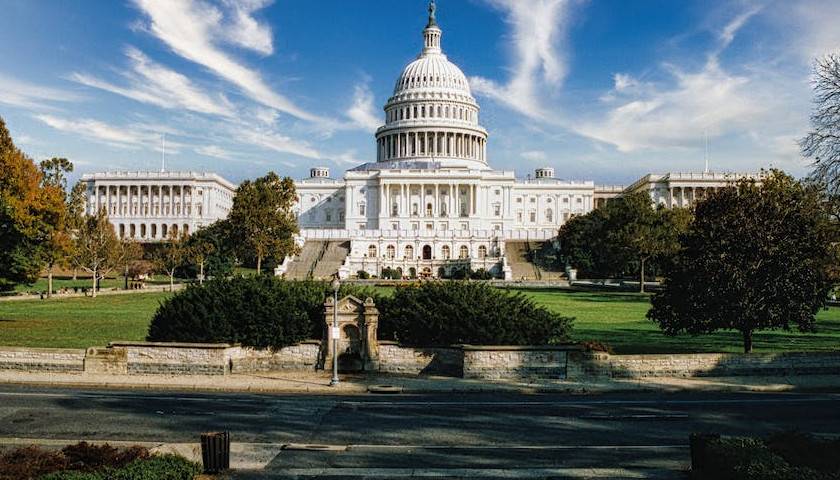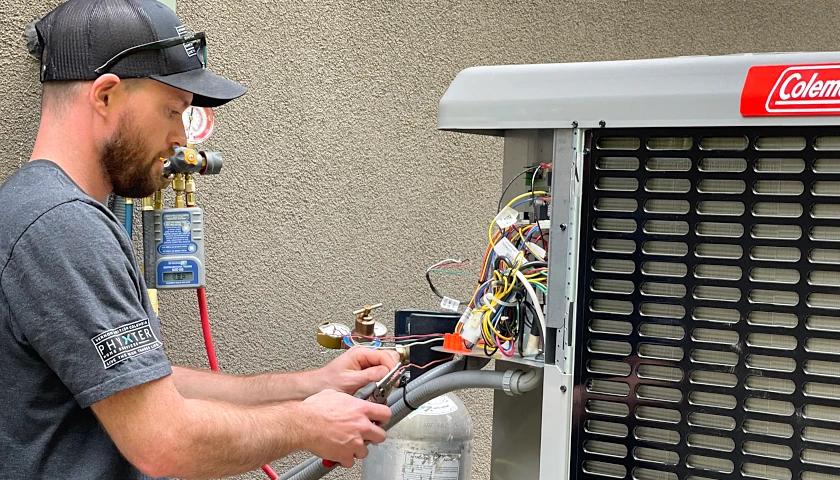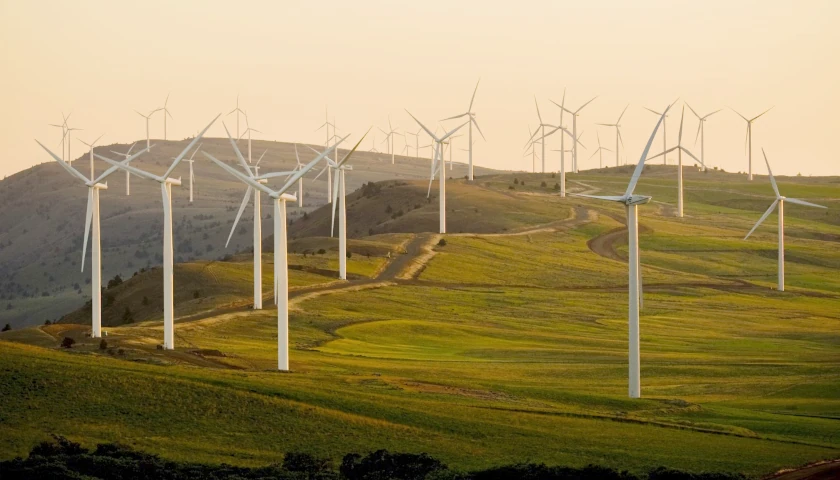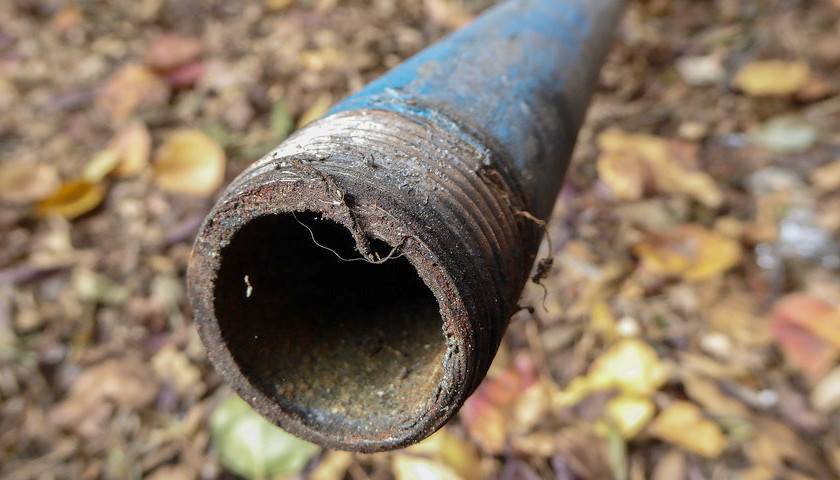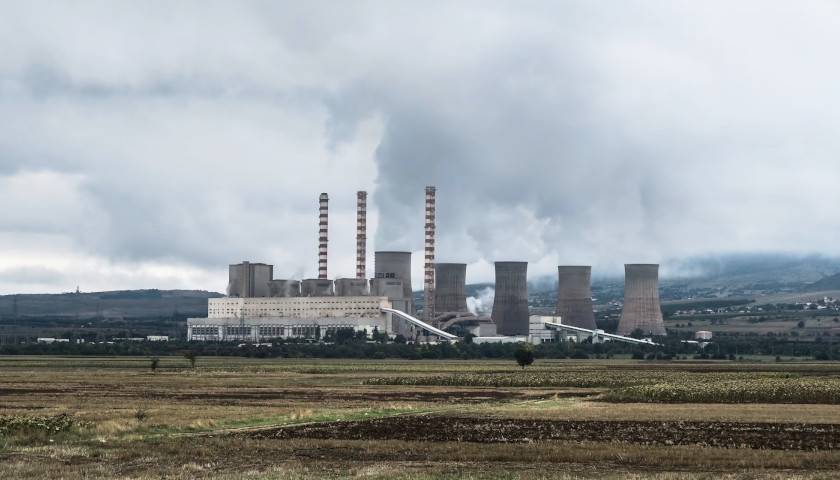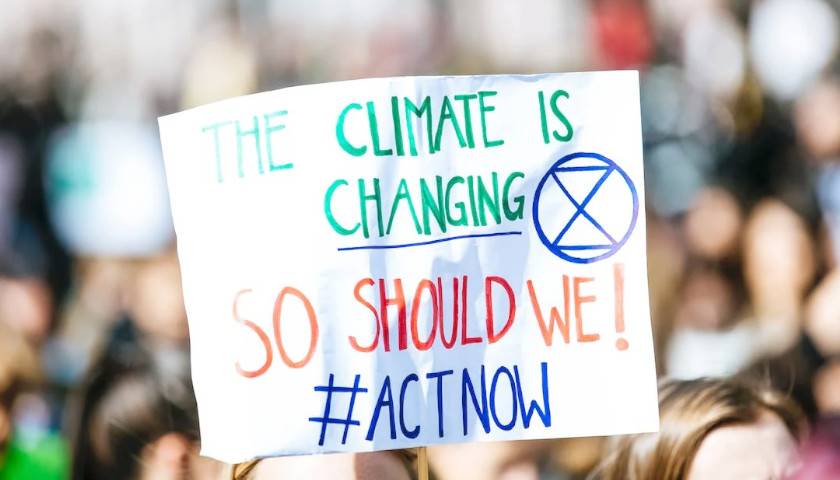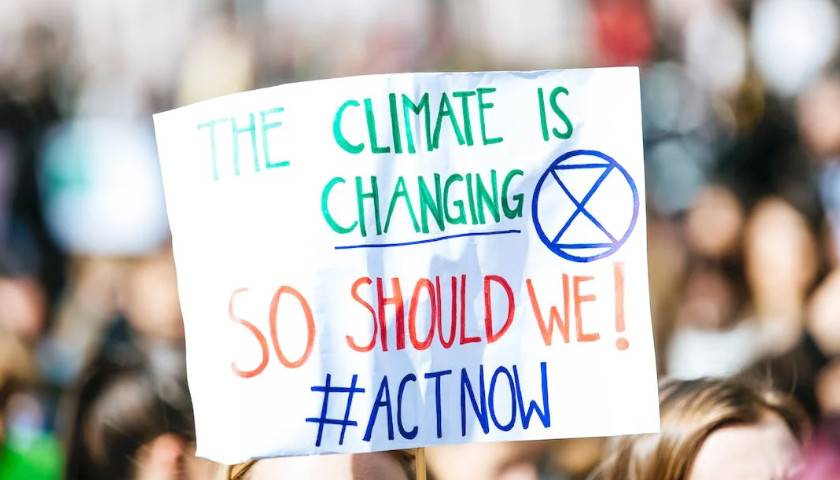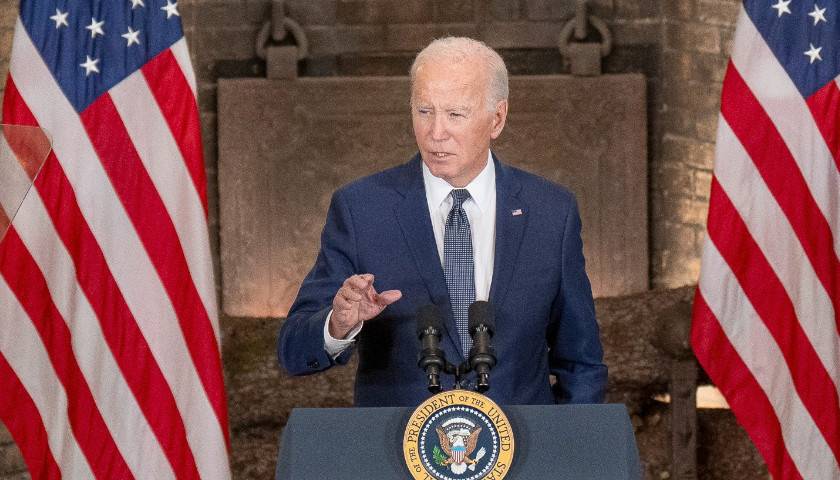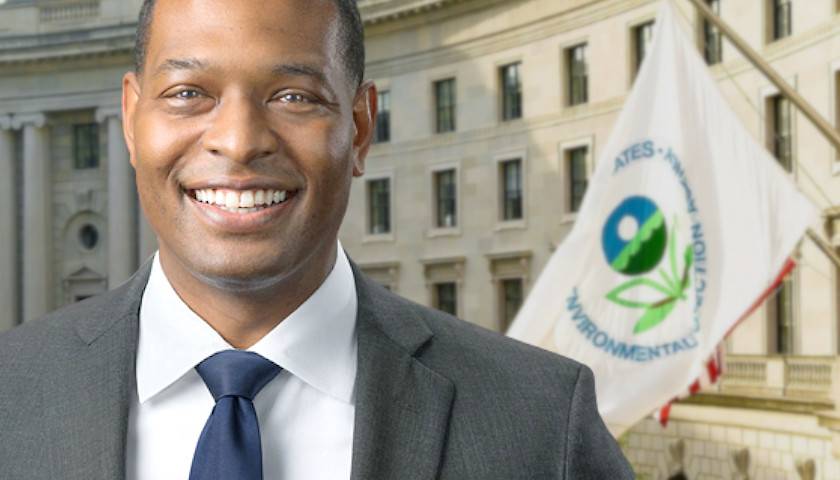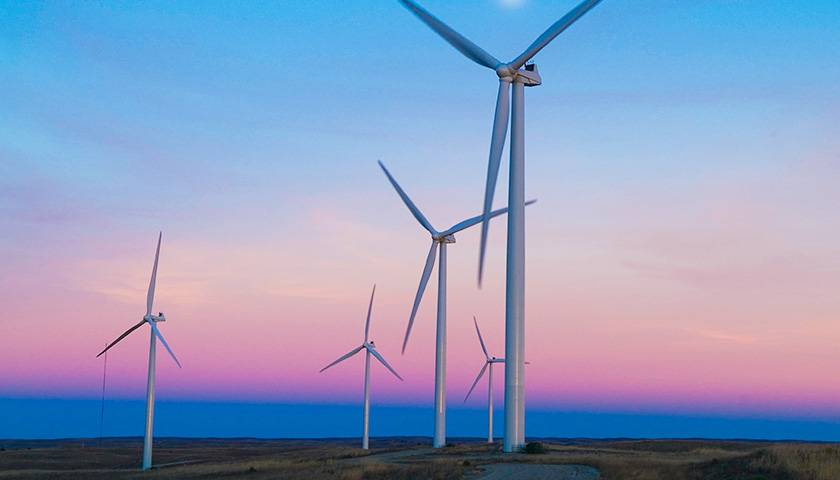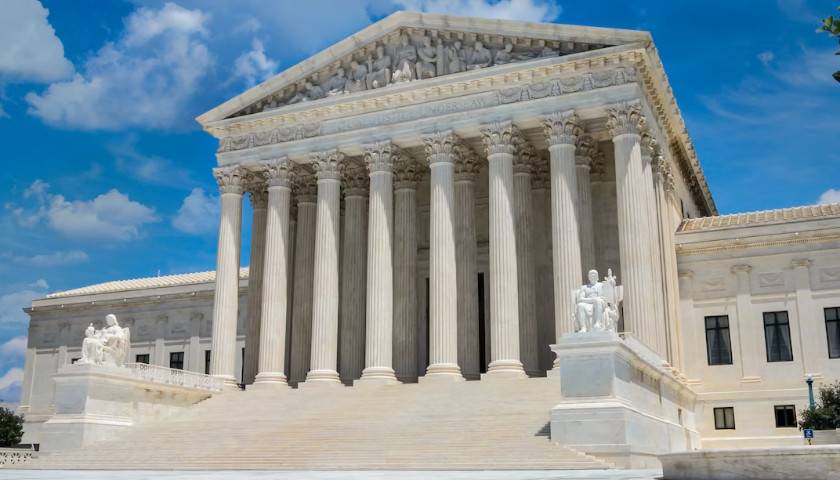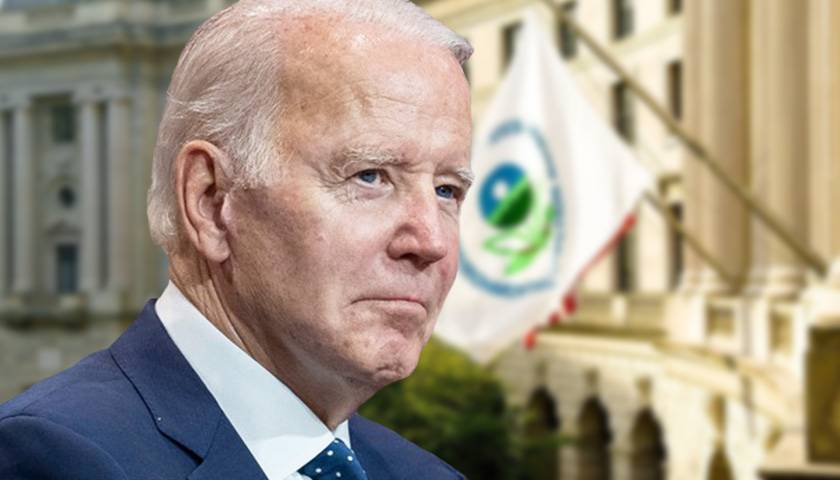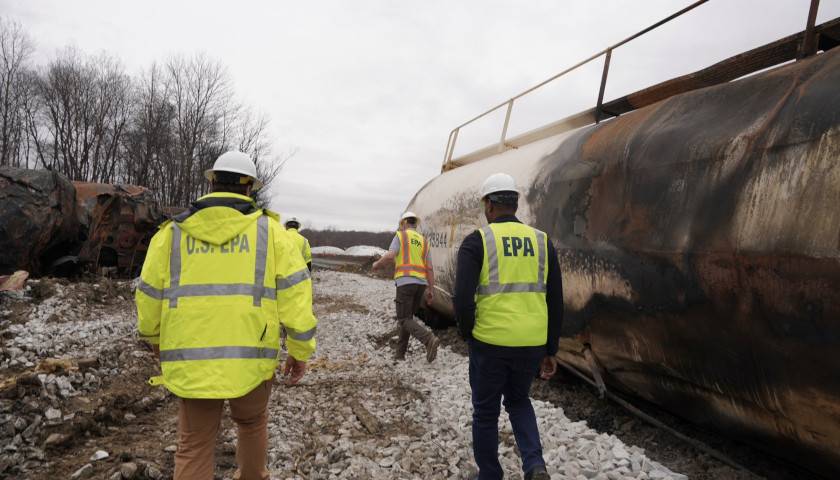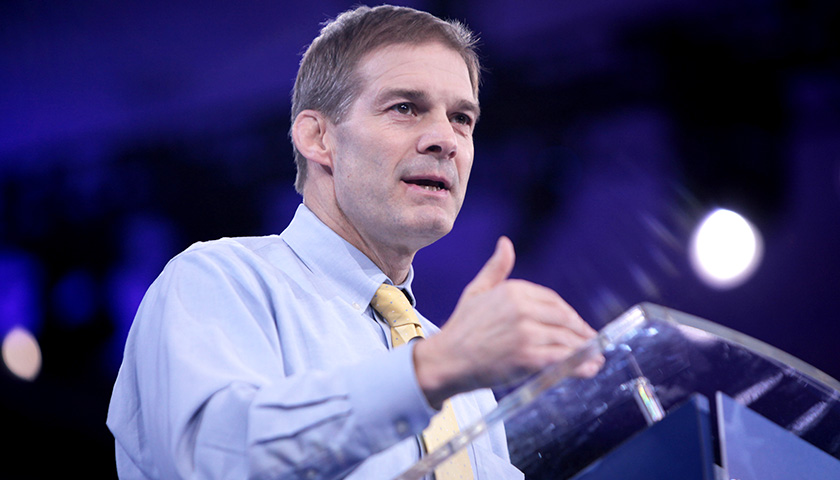Organizations that manage, coordinate and monitor electricity service for 156 million Americans across 30 states are warning that the Biden-Harris administration’s power plant rule will be catastrophic for the nation’s grid. Four regional trade organizations (RTO), as they’re called, recently filed an amicus brief, also known as a friend of the court brief, in support of a multi-state lawsuit against the EPA over the rule.
Read MoreTag: EPA
Supreme Court’s Coming Term to Feature Cases on Child Sex Change Limits, Guns and Pornography
The Supreme Court’s coming term will include cases on child sex change limits, guns and pornography.
The 2024-2025 term will kick off when the justices hear their first case on October 7. To date, 28 petitions have been granted, with more cases to be added to the docket in the coming weeks.
Read MoreReport: RFK Jr. Plans to Drop Out of Presidential Race This Week and Endorse Trump
Rumors are swirling that Independent presidential candidate Robert Kennedy Jr. plans to drop out of the race as early as this week and endorse Republican nominee Donald Trump.
Read MoreBiden EPA Cuts Big Check for Pro-Defund the Police Activists to Pursue ‘Climate Justice’ for Convicts
The Environmental Protection Agency (EPA) is sending up to $3 million to an activist group that advocates for slashing police budgets and prison closures to pursue “climate justice” for convicts and “reentry communities.”
The Ella Baker Center for Human Rights (Baker Center) and the Insight Garden Program were selected for receipt of between $1 million and $3 million to pursue “Environmental and Climate Justice in Prison and Reentry Communities.” The Baker Center has previously endorsed or advocated for left-wing activist positions like defunding the police, effectively decriminalizing shoplifting, closing prisons and more.
Read MoreCommentary: Draining the Swamp Is Now a Job for Congress
Wading into the confusing abyss of administrative law, on June 28 the U.S. Supreme Court, by a 6-3 vote, overruled the much-criticized 1984 decision in Chevron, restoring the bedrock principle — commanded by both Article III of the Constitution and Section 706 the 1946 Administrative Procedure Act — that it is the province of courts, not administrative agency bureaucrats, to interpret federal laws. This may sound like an easy ruling, but the issue had long bedeviled the Supreme Court. Even Justice Antonin Scalia, an administrative law expert, supported Chevron prior to his death in 2016. In Loper Bright Enterprises v. Raimondo, Chief Justice John Roberts sure-footedly dispatched Chevron.
If, as I wrote for The American Conservative in 2021, “Taming the administrative state is the issue of our time,” why did the Supreme Court unanimously (albeit with a bare six-member quorum) decide in Chevron to defer to administrative agencies interpretations of ambiguous statutes, and why did conservatives — at least initially — support the decision? In a word, politics. In 1984, the President in charge of the executive branch was Ronald Reagan, and the D.C. Circuit — where most administrative law cases are decided — was (and had been for decades) controlled by liberal activist judges. President Reagan’s deputy solicitor general, Paul Bator, argued the Chevron case, successfully urging the Court to overturn a D.C. Circuit decision (written by then-Judge Ruth Bader Ginsburg) that had invalidated EPA regulations interpreting the Clean Air Act. Thus, in the beginning, “Chevron deference” meant deferring to Reagan’s agency heads and their de-regulatory agenda.
Read MoreEnvironmentalists Grateful for Appellate Win over Chemical Industry Giant
Health advisories issued by the U.S. Environmental Protection Agency about the risks of chemicals produced at a North Carolina plant on the Cape Fear River are lawful and not reviewable by a court.
In a ruling by three judges Tuesday at the 3rd U.S. Circuit Court of Appeals in Philadelphia, Justice Arianna Freeman wrote, “The health advisory provides guidance, but it imposes no obligations, prohibitions, or restrictions. The health advisory also does not give rise to any ‘direct and appreciable legal consequences.’”
Read MoreBiden Admin Cuts Multi-Billion Dollar Check to Push ‘Community-Driven’ Green Projects All Over America
The Biden administration announced Monday that it is sending billions of dollars across the country to advance climate change-related projects.
The Environmental Protection Agency (EPA) said Monday that it is sending a combined $4.3 billion to help fund 25 applicants build “community-driven” climate projects across 30 states. The projects include electric vehicle (EV) charging station construction, funds to help local governments expedite green energy siting and programs to enhance heat pump adoption.
Read MoreCommentary: The Nationwide 500,000 Electric Vehicle Charger Charade
The word charade has several meanings, and including an act or event that is clearly false (Cambridge Dictionary), something done just for show (Vocabulary.com), or a situation in which people pretend that something is true when it clearly is not (Oxford Leaner’s Dictionary).
The charade I refers to is President Biden’s $7.5 billion dollar investment to install 500,000 electric charging stations along America’s highways by 2030. A reliable and convenient public EV charging infrastructure is critical to achieve the President’s goal of meeting the recent EPA CO2 emission regulation that require nearly 72 percent of U.S. new light vehicle sales to be fully electric or plug-in hybrid by 2032. Without diving deeper into the announcement, one would likely assume that $7.5 billion is sufficient to construct the 500,000 charging stations, one every 50 miles along the nation’s highways.
Read MoreCorn Growers Join Lawsuit Against EPA for Emissions Mandates
Several U.S. oil and corn industry lobby groups are suing the Biden Administration over its plans to slash planet-warming tailpipe emissions from cars and trucks. The coalition argues the regulations will cause economic harm.
The EPA finalized new rules for models of semi-trucks, buses and other heavy-duty vehicles released from 2027 to 2032 in a bid to cut greenhouse gas emissions.
Read MoreStudy: Biden Administration’s EPA Rules Could Cause Blackouts for Millions of Americans
A new study by a state government has determined that the many new regulations of the Biden Administration’s Environmental Protection Agency (EPA) could lead to power blackouts that will impact millions of American citizens.
According to the Washington Free Beacon, the study, conducted in May, was carried out by the firm Always On Energy Research, on behalf of the state government of North Dakota. The report concluded that the EPA’s most recently-implemented regulations are not technologically feasible and will only lead to the forced retirement of coal power generation units. Coal and other more reliable forms of energy will be replaced by unreliable energy sources, such as wind and solar, which are heavily dependent upon seasons and the weather.
Read MoreNorfolk Southern Reaches $310 Million Settlement with EPA, DOJ over East Palestine Derailment
Norfolk Southern reached a $310 million settlement with the Environmental Protection Agency and the Department of Justice on Thursday over a train derailment in East Palestine, Ohio, last year.
The settlement, which has yet to be approved by the U.S. District Court for the Northern District of Ohio, requires Norfolk Southern to spend an estimated $235 million for clean-up, $30 million for water quality monitoring, $25 million for a 20-year community health program, and $6 million to prioritize addressing historical pollution through a “waterways remediation plan,” reported the Washington Examiner.
Read MoreBiden Admin Unveils $3 Billion for Push to Replace All Lead Pipes in 10 Years
The Biden administration announced $3 billion in funding for its initiative to get rid of every lead pipe in the U.S. over the next ten years on Thursday.
The Environmental Protection Agency (EPA) unveiled the funding, which comes from the bipartisan infrastructure package of 2021 and is part of a larger $15 billion push to replace every lead pipe in the U.S. within a decade. President Joe Biden will tout his administration’s lead pipe removal spending at a Thursday event in North Carolina, according to the White House.
Read MoreBiden EPA Projects Americans Wasting Billions of Dollars’ Worth of Time Charging Up EVs
The Environmental Protection Agency (EPA) is projecting that Americans could waste billions of dollars’ worth of time juicing up their electric vehicles (EVs).
As part of the Biden administration’s broader EV agenda, the EPA finalized aggressive tailpipe emissions standards on Wednesday that are designed to force manufacturers to massively increase the proportion of EVs they produce and sell. The regulatory impact analysis for that rule features estimates for costs of time spent refueling EVs over the coming decades, and the EPA is expecting that Americans will have wasted approximately $1.7 billion worth of time charging their EVs by 2055.
Read More16 States Sue Biden Admin over Natural Gas Exports Approval Pause
A coalition of 16 states is suing the Biden administration over its January decision to pause approvals for new liquefied natural gas (LNG) export hubs.
The lawsuit, which names President Joe Biden, the Department of Energy (DOE) and high-ranking DOE officials as defendants, seeks declaratory and injunctive relief from the pause, which the White House announced on Jan. 26 to give the DOE time to assess the climate impacts of new LNG export capacity. The states filed their challenge in the U.S. District Court for the Western District of Louisiana, alleging that the federal government broke the law by broadly denying relevant permits.
Read MoreCommentary: Biden EPA’s Latter-Day Prohibition Targets Auto Industry
Not since Prohibition has the federal government sought to ban a product as popular as the internal combustion engine.
This week, the Environmental Protection Agency released its final emissions standards rule, requiring that 70% of new vehicle sales be pure battery-powered electric or hybrids by 2032.
Read MoreProgressives, Conservatives Not Happy with EPA’s New Rule on Vehicle Emissions
The U.S. Environmental Protection Agency said Wednesday it is finalizing more protective emissions standards that it called the “strongest ever” for light-duty and medium-duty vehicles that it claims will reduce air pollution and be phased in from 2027 through 2032.
In a news release, the EPA claimed the standards would result in a reduction of 7 billion tons of carbon emissions and have a net benefit of $100 billion in terms of public health benefits as well as reduced fuel costs and maintenance and repair costs for drivers.
Read MoreBiden Admin Finalizes Stringent Tailpipe Emissions Standards
The Biden administration unveiled its final tailpipe emissions standards for vehicles Wednesday, effectively requiring about 67 percent of all light-duty vehicles sold after model year 2032 to be electric vehicles (EVs) or hybrids.
The Environmental Protection Agency’s (EPA) finalized standards rolled back some of the de facto EV production benchmarks for manufacturers proposed initially, but still require automakers to reach the final standards set forth in the agency’s April 2023 proposal. The agency finalized the standards as the American EV market is struggling: demand has not grown as quickly as expected, manufacturers are losing billions on their EV product lines, executives have backed away from near-term production targets and Biden administration subsidy programs to facilitate the creation of a nationwide EV charging network have so far failed to make much of an impact.
Read MoreGreen: Taxpayers’ $3 Billion Supplying Clean Ports Program
The Biden administration’s choice for zero-emissions operations in America’s ports was boosted Wednesday with the opening of applications for $3 billion from taxpayers in the Clean Ports Program.
Equipment and infrastructure needs can be met that “reduce mobile source emissions at U.S. ports,” a release from the U.S. Environmental Protection Agency says. EPA Administrator Michael Regan was in Wilmington, N.C., alongside Gov. Roy Cooper, whose administration he previously worked in, to make the announcement.
Read MoreCommentary: Republicans Roll over on ‘Climate Change’
Why are Republicans supine in the fight against the Marxist takeover of our entire way of life? They are petrified, for some reason, about engaging the debate on the “science” of “climate change.”
This abandonment of the playing field has allowed climate spending to overtake the landscape like Kudzu vines on steroids.
Read MoreBiden Admin Reportedly Set to Greenlight Rule Change That Could Spike Gas Prices — But Not Until After the Election
The Biden administration is expected to ease seasonal restrictions on ethanol-gasoline blends but has delayed the change until after the 2024 election to avoid a price spike, according to Reuters.
The rule change stems from a 2022 request from the governors of Illinois, Iowa, Minnesota, Missouri, Nebraska, Ohio, South Dakota and Wisconsin to allow the sale of gasoline with 15% ethanol year-round, known as E15 gasoline, lifting current seasonal restrictions that aim to reduce smog in the summer months, according to Reuters. The Environmental Protection Agency (EPA) had originally set an effective date of April 28, 2024, for the changes when the agency sent the proposal to the White House in December, but that is now expected to be pushed back to 2025.
Read MoreBiden Admin Doles Out $600 Million to Activist Groups, Universities for ‘Environmental Justice’
The Biden administration is shelling out $600 million in taxpayer funds to grantmaking organizations to distribute for “environmental justice” projects all across the country, the Environmental Protection Agency (EPA) announced Wednesday.
The funds will go to 11 different organizations, which include universities and left-wing groups that focus on advancing social justice causes in addition to their environmental advocacy, according to the EPA’s announcement. Each of the recipients will in turn use the money to provide sub-grants to local organizations to pursue thousands of “environmental justice” projects like environmental jobs training programs and “healthy homes” initiatives.
Read MoreHouse Passes Bill Hitting Back Against Biden’s EV Agenda
The House passed a bill Wednesday that would neutralize one of the key policies underlying the Biden administration’s electric vehicle (EV) push.
The Choice in Automobile Retail Sales (CARS) Act passed by a bipartisan vote in the legislature’s lower chamber, and it will now head to the Senate. The bill would prevent the Environmental Protection Agency (EPA) from imposing new vehicle emissions rules that either mandate the use of a specific technology or reduce the availability of new cars based on the type of engine.
Read MoreBiden Admin Preparing to Finalize Barrage of Methane Regulations
The Biden administration is gearing up to finalize a host of emissions rules and regulations in the coming months, E&E News reported Wednesday.
The rules and regulations are all focused on methane, a greenhouse gas that is more potent, but dissipates more quickly, than carbon dioxide, and align with the administration’s commitment to attacking climate change with a “whole-of-government” response. The Biden administration is aiming to finalize the slew of methane regulations in the coming months ahead of the 2024 election, which would make the rules more difficult for a potential Republican administration to scrap should President Joe Biden lose, according to E&E News.
Read MoreCommentary: The EPA’s Coming Energy Catastrophe
The nation’s electric grid experts and operators now work in a constant state of emergency. There’s little if any respite in the change of seasons. Fears of soaring electricity demand overwhelming power supplies during searing summer heat are now matched by an equally unnerving fear millions will be left shivering in darkness during the coldest days of winter.
The question is no longer will there be rolling blackouts or grid emergencies but rather when or where.
Read MoreEPA Shelled Out Millions to Dem Megadonor-Tied Group Seeking to Hamstring American Industry
The Environmental Protection Agency (EPA) gave a $13 million grant to a Michael Bloomberg-tied group looking to undermine a key U.S. industry under the EPA’s regulatory purview.
The EPA grant went to the Deep South Center For Environmental Justice (DSCFEJ), a grassroots eco-activism group that is a coalition partner of Bloomberg Philanthropies’ “Beyond Petrochemicals” campaign, according to the campaign’s website. The “Beyond Petrochemicals” campaign seeks to halt the expansion of petrochemical projects that manufacture fertilizer, plastics and packaging in the U.S., according to its website.
Read MoreMost EPA Employees Really Don’t Want to Show Back Up to the Office, Survey Finds
More than 80% of surveyed Environmental Protection Agency (EPA) employees said that they would experience “personal hardships” if the agency changes its remote work policies to align more with the White House’s push to get government employees back into their offices, E&E News reported.
The survey results indicate that there is a significant disconnect between rank-and-file EPA employees and senior Biden administration officials over the White House’s return-to-office push for federal employees who have enjoyed expanded remote work policies since the pandemic. About 66% of the survey’s respondents said that they would consider leaving the agency if remote work flexibility diminished, and more than 65% of polled EPA employees said that reductions to remote work would negatively impact “diversity, equity, inclusion and accessibility,” according to a summary of the survey’s results.
Read MoreCommentary: The Biden Admin Has a Bad Regulation for Every Room in Your House
This year began with federal regulators targeting gas stoves, but we have since seen a host of other proposals going after washing machines, refrigerators, dishwashers, ceiling fans, water heaters, and others. They are all part of the Biden administration’s prioritization of the climate change agenda over the interests of consumers. Each runs the risk of boosting appliance prices, limiting choice, and compromising performance. And cumulatively, they add up to substantial headaches for homeowners that will only grow in the years ahead.
Read MoreEPA Poised to Turbocharge Biden’s Climate Agenda After Ripping Up Trump-Era Rule
The Environmental Protection Agency (EPA) on July 7 rescinded a Trump-era EPA rule which required the agency to conduct benefit-cost analysis of any significant new air pollution rules.
While it was in effect, the rescinded benefit-cost analysis rule required the EPA to identify the specific problem a new air pollution regulation addresses, explain why market alternatives cannot solve that problem and distinguish between direct and indirect health benefits that an air pollution emission is expected to generate. The Biden EPA will be able to more freely pursue its regulatory agenda against fossil fuels using the Clean Air Act after issuing a final rescission of the benefit-cost rule.
Read More19 State Attorneys General Sue Biden Admin over Electric Trucking Rules
Nearly 20 state attorneys general are filing a lawsuit against the Biden Administration’s Environmental Protection Agency (EPA) over regulations it has attempted to implement demanding that the trucking industry shift towards electric vehicles.
In an op-ed for Fox News, Iowa Attorney General Brenna Bird (R-Iowa) refers to policies first enacted back in March, in conjunction with an effort by the state of California to ban gas or diesel trucks in favor of electric trucks, ostensibly in the name of reducing so-called “global warming.”
Read More10 States to Sue EPA for Not Updating Wood Stove Emission Standards
Ten states and a regional government clean air agency plan on suing the Environmental Protection Agency for allegedly failing to update emission standards for wood-burning stoves, allowing high-emission stoves to still be sold.
The mostly Democratic state attorneys general filed a notice of intent to sue the EPA last week.
Read MoreCommentary: The EPA’s Proposed Carbon Capture and Storage Regulations Is a Trial Lawyer’s Dream
In May, the US Environmental Protection Agency proposed new regulations that will require power plants to capture almost all their CO2 emissions, compress them, transport them via a network of pipelines, and store them underground. The plan is economic folly, but the problems go beyond money: CO2 injected underground may well escape into the atmosphere or contaminate underground water supplies, either of which could yield deadly results and create a feeding frenzy of litigation. The liability risks will be another nail in the coffin for the country’s reliance on fossil fuels to supply electricity, which in 2022 accounted for about 60% of all generation.
Read MoreGOP House Settles Rift, Returns to Conservative Agenda in Passing Bill Protecting Gas Stoves
The rift with within the Republican House Conference that shut down floor votes last week appears to have been resolved enough for the chamber to resume voting, with the Tuesday passage of a marquee conservative bill to stop Biden administration initiatives to further regulate gas-powered stoves.
The Gas Stove Protection and Freedom Act passed 248-180, after failing to get a final vote last week because 11 conservative-leaning conference members – in a nearly unprecedented move – blocked a preliminary procedural vote, essentially over what they considered House GOP leadership’s mishandling of the debt-ceiling agreement with Democrat President Joe Biden.
Read MoreCommentary: The Nonsensical ‘Holy Climate Panacea’ Triad of More Wind, Solar, and Electric Cars is Maddening
This list could be closer to 50 but let’s just stick to a handful of them. I literally live in this business every day, and I’m just so confused.
Read MoreSupreme Court Rolls Back Biden EPA’s Expansive Water Regulation
The Supreme Court rolled back the Environmental Protection Agency’s (EPA) authority to regulate under the Clean Water Act (CWA) in a unanimous decision Thursday.
Sackett v. Environmental Protection Agency, brought by a couple prevented by the EPA from building a home on their own land near Priest Lake, Idaho because it contained wetlands, considered the scope of the agency’s “waters of the United States” (WOTUS) rule, which defines what “navigable waters” can be regulated under the CWA. Plaintiffs Chantell and Mike Sackett, who have spent 15 years fighting the agency’s rule in court, allege the EPA has overstepped the authority it was granted when Congress enacted the CWA in 1972—forcing them to stop construction on their land or face fines.
Read MoreHouse Follows Senate in Voting for Resolution to Halt Tougher EPA Vehicle Emission Standards
The GOP-led House on Tuesday voted in favor of a resolution to strike down the Environmental Protection Agency’s emissions restrictions for heavy-duty trucks.
The joint-chamber resolution, which passed the House by a 221-203 vote, was introduced by Republican lawmakers in February via the Congressional Review Act (CRA) – a law that allows Congress to reverse rules made by a federal agency.
Read MoreAmericans Less Concerned about Environment as Battle over Far-Reaching ‘Waters of the U.S.’ Hits Fever Pitch
As the battle over the controversial federal Waters of the United States environmental rule heats up, new polling shows that Americans are growing less concerned about the environment.
Newly released Gallup polling found a dip in environmental concerns, even though the Biden administration continues to push increasingly far-reaching policies.
Read MoreEPA Proposes New Standards to Require Two-Thirds of New Car Sales by 2032 Be EVs
The Environmental Protection Agency on Wednesday announced what is being considered its strongest-ever proposed pollution standards for gas-powered vehicles – which if enacted would effectively mandate that 67 percent of new passenger vehicles sold in the U.S. in 2032 must be zero-emission ones.
The rule has been expected for weeks and is a dramatic, proposed increase from President Biden’s stated goal of 50 percent zero-emission passenger car sales – including battery-powered electric vehicles, plug-in hybrids and fuel-cell vehicles – by 2030. It would also likely and dramatically increase EV sales, which accounted for just 5.6 percent of new car sales in the U.S. last year, according to Road & Track.com.
Read MoreBiden Vetoes Bipartisan Attempt to Repeal EPA’s ‘Waters of the United States’ Rule
President Joe Biden vetoed a bipartisan bill Thursday that would limit his administration’s broad interpretation of the “waters of the United States” (WOTUS) rule that grants the Environmental Protection Agency (EPA) significant new authority.
The president rejected the bill, arguing that his administration’s new rule provides “clear rules of the road” to protect both economic efforts and water quality under the Clean Water Act, according to the veto. The rule dramatically expands the traditional limits of WOTUS — which allow the EPA to regulate navigable waters — to include all territorial seas, interstate waters, adjacent wetlands, traditional waters’ tributaries and some artificial reservoirs.
Read MoreCommentary: The ‘Lower Energy Costs Act’ Could Be a Big Win for Americans
Before they scooted out of lawless and increasingly dangerous Washington, DC, for the Easter recess, the House of Representatives passed the most important energy legislation (emphasis on “energy”) Congress has considered in almost a decade.
The Lower Energy Costs Act is a buffet of various energy and permitting provisions ranging from an affirmation of the wisdom of exporting crude oil (which strengthens the United States’ own domestic oil and natural gas production) to a remedy for a nettlesome provision in the Clean Water Act that has given States a de facto veto over energy projects.
Read MoreEPA Takes over Management of Ohio Train Accident, Orders Railway to Clean Up Toxic Spill
The U.S. Environmental Protection Agency on Tuesday announced that it would be seizing oversight of the ongoing Ohio train derailment disaster, ordering the company behind the incident to submit to an EPA-approved cleanup plan as part of its management of the crisis. The EPA said in a press release that it would “approve a workplan outlining all steps necessary to clean up the environmental damage caused by the derailment.”
Read MoreEPA Quietly Quadruples Regulatory Cost of Carbon Emissions in New War on Fossil Fuels
With the price of everything from gasoline to food soaring in America, nobody is surprised by inflated price tags these days. But even by Washington standards, an action taken earlier this month by the Environmental Protection Agency is creating sticker shock: a nearly fourfold increase in the government calculation of damages from carbon emissions.
Read MoreOhio U.S. Rep. Jim Jordan Demands Biden Admin Show Compliance with Landmark Energy Decision
Republican Ranking House Judiciary Committee Member Jim Jordan told Biden administration authorities Tuesday to show how their agencies are obeying the Supreme Court’s June West Virginia v. EPA decision limiting the EPA’s power to unilaterally regulate emissions.
The court ruled in West Virginia v. EPA that the Environmental Protection Agency (EPA) could not set carbon dioxide emissions caps for power plants to force a national transition away from coal power without explicit congressional authorization. Jordan sent letters to Attorney General Merrick Garland, Under Secretary of Commerce for Intellectual Property Kathi Vidal, Department of Homeland Security (DHS) Secretary Alejandro Mayorkas and Federal Trade Commission (FTC) Chair Lina Khan asking whether their agencies are complying with the decision.
Read MoreBiden’s EPA Could Kneecap America’s Largest Natural Gas Exporter
The Biden administration is expanding restrictions on carbon emissions that could impact half the liquefied natural gas (LNG) export capacity in the U.S.
The Environmental Protection Agency (EPA) is expanding a rule under the U.S. Clean Air Act called the National Emissions Standards for Hazardous Pollutants (NESHAP), which places restrictions on the emission of formaldehyde and benzene from stationary combustion turbines. Starting in August, the rule will now apply to two types of gas-fired turbines that were previously left out of the regulation, the EPA announced in February.
Read MoreAbbott: EPA Plan Will Cripple Oil Production in Permian Basin, Raise Gas Prices Further
Texas Gov. Greg Abbott is pushing back against an Environmental Protection Agency proposal that he says would cripple oil and gas production in the Permian Basin – potentially jeopardizing a quarter of the U.S. gas supply.
Read MoreEPA Inspector General Report Finds Contractor Manipulated Air Filter Data
The Environmental Protection Agency’s Office of Inspector General found that a laboratory contractor with the Office of Research and Development inappropriately manipulated air filter data and failed to follow the appropriate guidance for data of 95 air filter samples, rendering them unusable.
The EPA said the data “drives regulatory decisions, and therefore, it is crucial to accurately assess the quality of data being collected.”
According to the Feb. 16 OIG report, in November 2018, the contractor “misidentified” a subset of filters that they had weighed “during either the loading process in the automated weighing system or by the manner of recording the weight of the filters after they were weighed.”
Read More‘America Is Back’: Biden Unveils Sweeping Oil, Gas Regulations That Would Cut Methane Emissions by 41 Million Tons
The Biden administration rolled out broad new regulations that it said will substantially reduce U.S. methane emissions within 15 years.
The sweeping regulations would cut methane emissions, which account for roughly 10% of the greenhouse gasses emitted by the U.S., by 41 million tons between 2023 and 2035, the Environmental Protection Agency (EPA) announced Tuesday. Such a reduction is equivalent to 920 million metric tons of carbon dioxide, or the amount emitted by all cars and commercial aircraft in 2019.
“As global leaders convene at this pivotal moment in Glasgow for COP26, it is now abundantly clear that America is back and leading by example in confronting the climate crisis with bold ambition,” EPA Administrator Michael Regan said in a statement.
Read MoreCommentary: Conservatives File Suit to ‘Derail Biden Climate Railroad’
Michael Regan began his tenure as President Biden’s Environmental Protection Agency administrator by dismissing dozens of outside scientific advisers appointed during the previous administration — part of an effort to “ensure the agency receives the best possible scientific insight to support our work.”
At the time, Regan (pictured) called it a “reset.” Opponents grumbled that it looked more like “a purge.” Now, one of those advisers, Stanley Young, has filed a lawsuit in federal court accusing the agency of violating U.S. law; the suit also seeks an injunction to halt the work of his former committee.
The legal dustup is the latest rearguard action from the right on environmental issues. Conservatives see the case as their best chance to thwart the Biden administration’s multi-agency approach to combating climate change, seen as hostile to the fossil fuel industry.
Read MoreBiden EPA’s Web of Conflicts with Climate Groups Forces Ethics Waiver for One Official
The revolving door between climate change special interests and the Biden Environmental Protection Agency has swung open so often in recent months that the agency is being forced to grant an ethics waiver to one of its politically appointed lawyers allowing her to participate in cases involving a former client.
Read More

